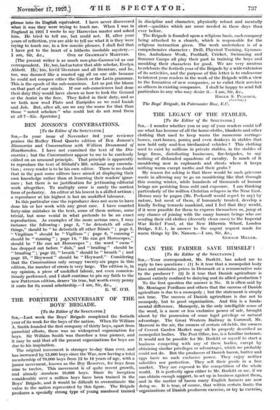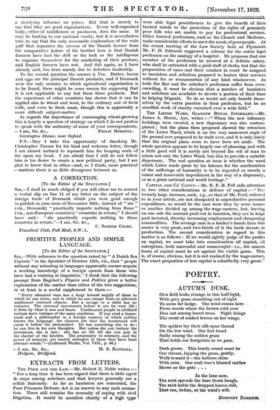CAN THE FARMER SAVE HIMSELF?
[To the Editor of the SPECTATOR.]
SIR,—Your correspondent, Mr. 13urkitt, has asked me to reply to two questions : (1) Is it true that a monopolist body fixes and maintains prices in Denmark at a remunerative rate to the producer ? (2) Is it true that Danish agriculture is almost entirely confined to dairying and its allied production ?
To the first question the answer is No. It is often said by Mr. Montague Fordham and others that the success of Danish agriculture is due to a monopoly ; but the statement is simply not true. The success of Danish agriculture is due not to monopoly, but to good organization. And this is a funda- mental difference. Monopoly, in the only intelligible sense of the word, is a more or less exclusive power of sale, brought about by the possession of some legal privilege or natural advantage. The Great Western Railway in Cornwall, Mr. Marconi in the air, the owners of certain oil-fields, the owners of Covent Garden Market may all be properly described as monopolist bodies. The Post Office, too, is a familiar instance. It would not be possible for Mr. I3urkitt or myself to start a, business competink with any of these bodies, except by obtaining similar privileges or advantages, which we probably could not do. But the producers of Danish bacon, butter and eggs have no such exclusive' power. They enjoy neither subsidies nor protection. They sell their goods in a free market. They are exposed to the competition of the whole world. • It is perfectly open either to Mr. Burkitt or me, if we can obtain enough support, to set up in business against them, and in the matter of bacon many English fanners are now doing so. It is true, of course, that within' certain limits the organizations of Danish producers exercise, or try to exercise, a steadying influence on prices. But that is merely to say that they are good organizations. Every well-organized body, either of middlemen or producers, does the same. It may be hurting to our national vanity, but it is nevertheless true, to say that the only reasonable explanation of the wide gulf that separates the success of the Danish farmer from the comparative failure of his brother here is that Danish farmers have had the skill or the luck or the intelligence to organize themselves for the .marketing of their produce, and English farmers have not. And thik again, as I have already said, has been mainly due to defective leadership.
To the second question the answer is Yes. Butter, bacon and eggs are the principal Danish products, and if Denmark were the only country in which agricultural organization is to be found, there might be some reason for supposing that it is not applicable to any but these three products. But the experience of other countries has shown that it can be applied also to wheat and wool, to the ordinary sale of fresh milk, and even to fresh meat, though this is apparently a more difficult subject-matter.
As regards the importance of encouraging wheat-growing this is largely a question of strategy on which I do not profess to speak with the authority of some of your correspondents.
—I am, Sir, &c., PHILIP MORRELL. Garsington Manor, near Oxford.
P.S.—May I take this opportunity of thanking Mr. Christopher Tumor for 'his kind and welcome letter, though I am almost inclined to reproach him for heaping coals of fire upon my head. I am afraid that I still do not follow him in his desire to create a new political party, but I am glad to know that in other—and, as I think, more practical —matters there is so little divergence between us.



























































 Previous page
Previous page